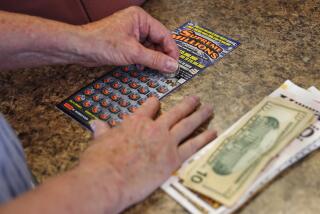A Catch 76 Situation
- Share via
Security Pacific Bank’s current statewide promotion of its automated teller machines is not as generous as it seems.
Customers using the machines now receive game pieces on their receipts. Collect a certain combination of pieces or an instant winner card and you collect a prize. The top award is $25,000, but 1 million of the 2.01 million “prizes” are instant winner cards good for $2 off the purchase of gasoline at participating Unocal 76 service stations.
Yes, there’s a catch. The coupon can only be used to buy eight or more gallons of pricey full-service gasoline. At the Unocal station at St. Andrews Place and Beverly Boulevard in Los Angeles’ Mid-Wilshire district, for example, eight gallons of self-service unleaded gasoline costs $7.67 while eight gallons of full-service gas costs $10.23--a $2.56 difference that more than wipes out the $2 savings from the coupon.
A bank spokeswoman blamed Unocal, saying the oil company insisted the coupon only be good for full-service gas. “That was how they cut the deal.”
What Pretzel Goes With It?
First came the light beers. Then came the wine coolers. Now, are Americans ready for the next drinking fad--”dry” beer?
That’s what Japan’s largest brewer, Kirin, wants to know. Much like dry wine, dry beer tastes less sweet because of a brewing process that eliminates most of the sugar. Although this concept is only 2 years old, the four major Japanese brewers are all making it. Dry beer already accounts for nearly 12% of beer sales in Japan, according to industry estimates.
Hoping to whet the American appetite for dry beer, Kirin began importing Kirin “Dry” into the United States last month. But Kirin plans no big marketing push--yet. For the time being, it is test-marketing the brew at Japanese restaurants on the West Coast, said Michael Palmer, vice president of marketing at Kirin’s U.S. importer, Martlet Importing Co. “So far,” Palmer said, “we haven’t been able to keep up with the demand.”
But that demand may not be very long term, said Tom Pirko, president of Bevmark Inc., a Los Angeles beverage industry research firm. Much like light beers and wine coolers, the success of the new dry beers will require millions of promotional dollars. “That’s the only way,” Pirko said, “to convince the American public to drink something it’s not particularly fond of.”
Nobody Here But the FBI
When FBI agents armed with a search warrant in a criminal investigation of defense fraud showed up at Litton Industries on June 15, it caused barely a ripple in the public relations department at the Beverly Hills-based company.
It seems that nobody was in the public relations office that day. While other defense contractors were issuing statements confirming that they were searched and that they intended to cooperate with the federal probe, Litton secretaries were suggesting that reporters “call back tomorrow.”
Robert S. Knapp, Litton director of corporate public affairs, said the lapse was an unusual event precipitated by a family emergency. He said he couldn’t recall any other time when the Fortune 500 company had been without public relations on a business day.
GTE Cuts Don’t Hold Water
Ever since March, GTE Corp. has been trying to cuts costs and become more competitive with other local telephone companies like Pacific Bell. But just how far will it go to slash expenses?
Pretty far. A memo outlined the latest effort in the Huntington Beach office. “Bottled water will be discontinued,” reported G. R. Van Allen, then the office’s network services manager. “This will include the coolers, refrigerators in the conference rooms and all bottled water. The cost of this service is approximately $600 a month.” Van Allen added he realized this would “cause a lot of discomfort to some.”
It gave employee Mike Drake the urge to write. In a letter to GTE California President David Anderson, he reported sighting “huge throngs of workers gathered at water coolers gulping down the remains of the precious juice.” Drake asked: “Is this the last act of a desperate man or what?”
Anderson sent a personal reply: “I can assure that his (Van Allen’s) actions were not that of a ‘Last Act,’ but rather a conscientious effort to reduce his department’s operating costs.”
More to Read
Inside the business of entertainment
The Wide Shot brings you news, analysis and insights on everything from streaming wars to production — and what it all means for the future.
You may occasionally receive promotional content from the Los Angeles Times.










